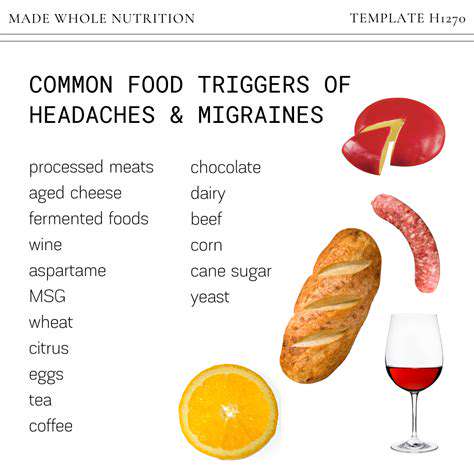Identifying Food Triggers for Headaches

Understanding the Connection
Pinpointing dietary headache triggers requires patience and careful observation. For many people, headaches emerge as a delayed reaction to specific foods or ingredients. The body's response might take hours or even days to manifest, making identification challenging.
Researchers continue exploring the complex mechanisms behind food-related headaches. Blood sugar fluctuations, neurotransmitter activity changes, and inflammatory responses all appear to play significant roles. Recognizing these potential connections empowers individuals to develop customized prevention approaches.
Common Food Suspects
Several food categories frequently appear as headache culprits. Aged cheeses, processed meats containing nitrates, chocolate, and caffeinated products often top the list. Maintaining a thorough food journal represents the most reliable method for uncovering personal triggers. Record every meal and snack alongside headache occurrences to identify patterns.
The Role of Tyramine
Tyramine, naturally present in fermented and aged foods, affects some individuals significantly. This compound can trigger blood pressure spikes and vascular changes that may initiate headache pain. Fermented soy products, cured meats, and aged cheeses typically contain higher tyramine concentrations.
Impact of Caffeine and Sugar
Caffeine consumption creates a paradoxical situation for headache sufferers. Both excessive intake and sudden withdrawal can provoke headaches in sensitive individuals. Similarly, blood sugar instability from high sugar consumption or meal skipping frequently contributes to headache development. Consistent dietary habits often help minimize these effects.
Dietary Considerations and Habits
Beyond specific foods, overall eating patterns influence headache susceptibility. Dehydration and irregular mealtimes rank among the most overlooked headache contributors. When fluid levels drop, blood vessels constrict, potentially triggering pain. Establishing regular hydration and eating routines supports overall wellness and may prevent headaches.
Keeping a Detailed Food Diary
A comprehensive food diary serves as the foundation for trigger identification. Document all consumption including beverages, portion sizes, and timing. Simultaneously tracking headache occurrences creates valuable data for pattern recognition. This meticulous approach enables meaningful correlations between dietary choices and headache episodes.
Seeking Professional Guidance
When self-identification proves challenging, medical professionals offer valuable support. Healthcare providers can analyze food diaries, medical history, and symptoms to develop personalized management strategies. They also help rule out other potential headache causes while providing evidence-based dietary recommendations.
Dietary Strategies for Headache Management

Dietary Triggers and Avoidance Strategies
Effective headache management begins with recognizing and eliminating problematic foods. Tyramine-rich foods like aged cheeses and fermented products frequently trigger migraines in susceptible individuals. Systematic food elimination followed by gradual reintroduction helps confirm specific triggers while maintaining nutritional balance.
Hydration and Headache Prevention
Adequate fluid intake remains one of the simplest yet most effective preventive measures. Dehydration frequently underlies tension headaches, making consistent water consumption throughout the day essential. Herbal teas and water-rich fruits complement plain water for maintaining optimal hydration levels.
The Role of Sugar and Processed Foods
Blood sugar instability from processed food consumption often contributes to headache development. Refined sugars and heavily processed ingredients create metabolic fluctuations that may trigger pain responses. Emphasizing whole foods with balanced macronutrients helps stabilize blood sugar and potentially reduces headache frequency.
Caffeine and its Impact on Headaches
Caffeine's relationship with headaches demonstrates significant individual variation. Understanding personal tolerance thresholds and maintaining consistent intake levels proves crucial for prevention. Gradual reduction rather than abrupt cessation helps avoid withdrawal headaches for those reducing consumption.
The Importance of Regular Meals
Consistent mealtimes support metabolic stability and headache prevention. Skipping meals, especially breakfast, frequently precedes headache episodes in susceptible individuals. Planning balanced meals and snacks at regular intervals helps maintain steady energy levels and prevents headache triggers.
Nutritional Deficiencies and Headaches
Inadequate nutrient intake may contribute to chronic headache patterns. Magnesium, B vitamins, and iron deficiencies particularly correlate with increased headache frequency. Professional nutritional assessment can identify specific deficiencies and guide targeted dietary adjustments or supplementation when appropriate.